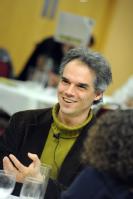Forage longer for berries, study on age-related memory decline suggests
 Like birds which stop foraging too early on a berry-laden bush, a new study suggests older people struggle to recall items because they flit too often between ‘patches’ in their memories.
Like birds which stop foraging too early on a berry-laden bush, a new study suggests older people struggle to recall items because they flit too often between ‘patches’ in their memories.
The study by the University of Warwick published in the journal Developmental Psychology seeks to model the mechanisms behind memory decline in old age.
seeks to model the mechanisms behind memory decline in old age.
Its findings indicate that specific changes in the way older people access their memories, rather than a general ‘slowing down’ in mental processing speed, may be to blame for some aspects of memory decline. Using what is known as an ‘animal fluency test’, a group of 185 participants aged between 29 and 99 were asked to name as many animals as they could in three minutes.
It has long been known that performance declines in line with age on these kinds of tests.
Typically, people will begin by naming animals in a semantically distinct ‘patch’ such as pets - for example dog, cat and hamster.
When this patch becomes depleted and they can no longer recall any similar animals they jump to another patch, for example predatory animals such as tiger, lion and panther.
People who perform best at these tests seem to be able to identify the optimal frequency to switch patches, ie once a patch has been depleted to the point where their energies are better focused on another, more fruitful patch.
The model developed by the University of Warwick researchers suggests that as people age, they tend to change patches too frequently, meaning they abandon patches before they have exhausted their full potential.
It is this mechanism, known as cue maintenance, which the researchers believe is behind age-related decline in memory search.
Dr Thomas Hills, Associate Professor in the Department of Psychology at the University of Warwick, said: “Memory can be compared to a physical landscape where people move between patches in order to recall items.
“Older people don’t just move more slowly around that memory landscape, the way they move differs to the way younger people move.
“You could say that their memory tends to be more flighty – like a bird which is foraging on a bush full of berries but only picks a few of them before moving to another bush.
“Moving between bushes takes energy and the next bush along might not be as full as the previous bush so this is not always a good strategy.
“Likewise, with memory there is an optimal time to leave each patch - and it seems older people simply leave too soon.”
Although further research is required to understand more deeply the mechanisms involved in memory search, Dr Hills had this suggestion to use these findings on a practical level.
“For example, if you forget your shopping list at the supermarket, try to focus on recalling items category by category, rather than flitting between different types of groceries. At the same time, try to use what you’ve already recalled to help you recall what you’ve forgotten,” he said.
ENDS
The study Mechanisms of Age-Related Decline in Memory Search across the Adult Life Span is available here 
Dr Thomas Hills can be contacted on thomhills at gmail dot com or +44 (0)75268 19276
Or Anna Blackaby, University of Warwick press officer, is available on a dot blackaby at warwick dot ac dot ukor +44 (0)2476 575910 or +44 (0)7785 433155
Video
Thomas Hills is available for broadcast interviews. You can see a short clip of him talking about his research below.
We have in-house broadcasting facilities for TV and radio. We have an ISDN line for radio, please contact us on 024 765 24668 to check availability. For television interviews we have the Globelynx TVReady network, a list of Warwick experts is available. If you are looking for an expert in an area that is not listed, please contact us on 024 765 24668. Our ISDN number is 024 7647 1287.
Further information
The study Mechanisms of Age-Related Decline in Memory Search across the Adult Life Span is available here
Dr Thomas Hills can be contacted on thomhills at gmail dot comor +044 (0)75268 19276
Or Anna Blackaby, University of Warwick press officer, is available ona dot blackaby at warwick dot ac dot ukor +44 (0)2476 575910 or +44 (0)7785 433155
Related links
x
